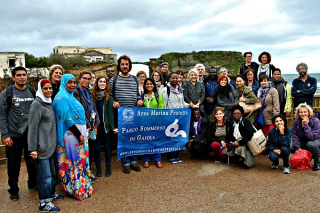The first ICCROM course on ‘Promoting People-Centred Approaches: Engaging Communities in the Conservation of Nature and Culture’ came to successful conclusion Friday 16 October 2015. In front of an audience which included the community representatives who helped host the event, participants shared their vision for a better society and healthier heritage.
During an intensive two weeks of presentations, group work, discussions and site visits, the 20 participants from 19 countries learned and exchanged views on the importance of people-centred approaches within the practice of conservation of culture and nature. Within the evolving conservation discourse, the need to place people at the heart of conservation was evident to the participants, as was the possibility of overcoming the nature/culture divide, all too often found in professional practice. Some of the themes highlighted during the course included the role of heritage in the lives of communities; the reciprocal benefits that can and should be gained by both heritage and contemporary society; the importance of traditional knowledge systems; and the role of heritage in sustainable development. Since approaches are tailored to individual cases, participants examined a range of participatory processes with a focus on some practical tools for engaging communities that have previously been found effective in real-life. In addition, the course provided a platform for exchanges on the 18 case studies in which the participants are currently engaged in their respective countries.
Through a range of site visits around the Bay of Naples the participants and resource people explored ongoing initiatives related to the engagement and participation of local communities. Participants explored wider approaches that addressed the need for integrated management, in particular linking Mount Vesuvius, the World Heritage sites of Pompeii and Herculaneum and the modern towns of Pompei and Ercolano with a view to providing reciprocal benefits to both people and heritage. In the city of Naples, a non-profit organization and a grassroots association which have taken over the management of the Gaiola Underwater Park and the catacomb complexes in Rione Sanità respectively, provided concrete and optimistic perspectives.
As a conclusion to the course, participants developed a vision for the conservation and management of the Vesuvian area with a view to adopting more people-centred approaches:
Participants’ feedback:
‘’My approach to community engagement and skills has improved tremendously. I am now a changed person in my communities as a heritage practitioner.’’ Sauda, Kenya
‘’Sometimes you feel that even though efforts have been made for conservation projects and the protection of heritage it fails and you don’t know why. Well, it was the community aspect missing and I really think the course helped me see the importance and gave me guidelines how to start doing it.’’ Marsela, Albania
‘’[This course made me] recognize that I’m not alone and lots of information, human resources and knowledge are available for improving my work.’’ Liza, Nicaragua
‘’It made me double-think on what we should call community. It gave me a new perspective on the enormous opportunities of culture-nature interlinks. It broadens my scope to the horizon of a people-centred approach.’’ Lazjon, Albania

